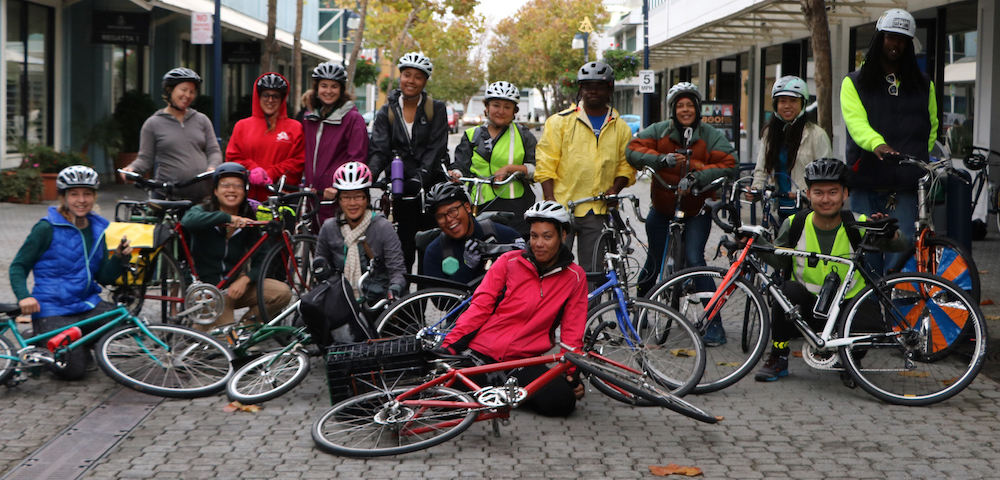Bay Area residents who give up cars steering against the flow
By Denis Cuff
Contra Costa Times
7/14/09
Single mother Annette Gormley drew up her grocery list and checked it twice as she waited for the No. 84 bus to rumble down her suburban Castro Valley street.
It pays not to forget the milk or pizza ingredients when you have chosen to live without a car.
“You have to plan ahead a little more. None of this: Oops. I just decided I got to go somewhere right now,” said Gormley, who walks and takes buses and trains.
She doesn’t regret her decision five years ago to sell her car. “It’s a lot easier to do than a lot of people think. Not owning a car slows down the pace of life a little, and it makes you pay more attention to your surroundings and talk to your family.”
Gormley joined an Orinda woman who has cut her driving by more than half, and an Oakland man who has not had a car in years in a challenge to Bay Area residents in June to drive less or not all.
In all, about 200 people took the challenge sponsored by Transform, an Oakland-based group that promotes environmentally oriented transit and land-use polices.
Transform organizers say they understand they’re fighting a strong cultural current as they try to reverse the heavy reliance on automobiles.
Fewer than one in 10 households in the Bay Area do not own a motor vehicle, about half the percentage in 1960, when one in five households did not have a car.
“I feel the society has groomed us to the allure and freedom of the car,” said Andrea Tyler, outreach manager for Transform. “But the auto is no longer living up to its expectations because of the adverse affects on our health and our environment.”
Transform said heavy reliance on automobiles has led to gridlock, stress, obesity, a lack of exercise, urban sprawl, a reduced sense of community, and smog and global warming.
Autos are costly, too. Americans spend an average of about $7,500 a year to own, operate and fuel a car, Transform says.
Gormley’s story shows that a suburban mother going to college and raising two sons active in Boy Scouts can get around without a car.
She said she never liked the stress and hassle of driving, and often commuted by public transit. Five years ago, she dumped the car.
During a morning shopping trip last week with her 12-year-old son, Benjamin, Gormley rode the bus to her favorite store a mile away.
Inside the grocery store, mother and son split up, collected the food items in their reusable grocery bags and reunited at the checkout stand. Gormley bought a coffee, and declared there was time to visit her son’s favorite video game store.
“I have the bus schedules in my head,” she said. “That helps.”
Gormley achieved her mission, boarding the bus home within 90 minutes of the end of her ride from home.
Gormley misses just one thing about not owning a car: She would like to take her boys to archery lessons in Berkeley, but “they don’t allow weapons on board a bus,” she said.
Gormley said that living near a bus stop is a big convenience many suburban residents don’t have.
In Orinda, Sara Lee said the infrequent bus service and lack of sidewalks on hilly roads make it more difficult to get around her town without driving.
Still, Lee, a mother of two children, cut her usual driving mileage of about 900 miles per month to 375 miles per month during the June challenge.
She walked one child to school, and hauled another in a bicycle with a trailer. She discovered she could pedal home with groceries in the trailer. “I felt the challenge opening up a whole world to me of opportunities to drive less,” she said. “But for some trips, you need a car.”
Chris Peeples, an AC Transit Board member from Oakland, said the access to buses and BART trains in his city has made it possible for him to go without a car for years.
“I live quite nicely in an old neighborhood built around a streetcar,” Peeples said. “Taking the bus or train gives me time to read.”
To turn the Bay Area toward less automobile use, Peeples said the Bay Area needs land-use policies that locate jobs and housing together, more bicycle and walking trails, and more public transit funding
“Unfortunately,” he said. “The state has been cutting transit funding. That’s the wrong way to be going.”


